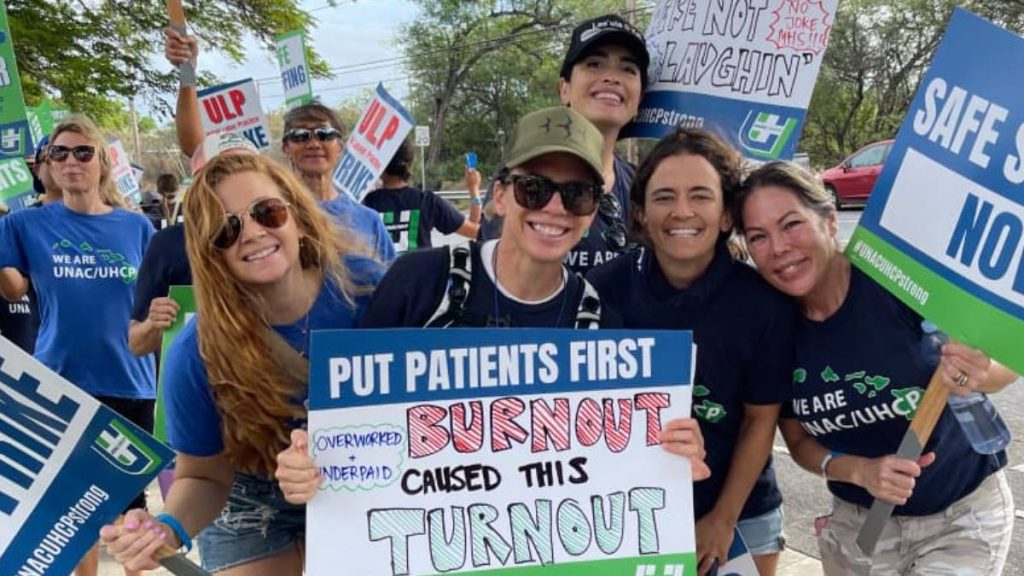Kaiser Permanente health care professionals in Hawaiʻi, California authorize its union to strike
About 30,000 registered nurses, pharmacists, therapists and other frontline professionals at Kaiser Permanente in Hawaiʻi and California authorized a strike on Friday over safe staffing and fair wages, according to a news release from the United Nurses Associations of California/Union of Health Care Professionals.
More than 1,900 Kaiser Permanente hospital workers in Hawai‘i, represented by the UNITE HERE Local 5 union, are also voting now on whether to strike. That union represents Kaiser Permanente workers at 25 clinics and medical centers across the Big Island, Oʻahu, Kauaʻi and Maui. Local 5 expects to announce the outcome of its strike authorization vote on Monday.
The yes vote gives union leadership the authority to call for a walkout once current contracts expire on Sept. 30.
The strike vote, held by the union, comes after six months of bargaining and what the union calls “six months of disrespect from Kaiser management, who workers say have repeatedly dismissed proposals to fix staffing, protect patients, and keep experienced caregivers at the bedside and everywhere else they are needed across the Kaiser system.”

Union president Charmaine S. Morales, RN, said: “Kaiser is betting we won’t unite and push for the change that patients need. This overwhelming vote proves them wrong. When we stand together, Kaiser will have no choice but to recognize the need to value our labor and ensure safe staffing and care.”
The union says there has been a sharp contrast between Kaiser’s billions in financial reserves and its stagnant wage proposals.
Kaiser, the fourth-largest nonprofit in the world and the largest health care system in the United States, increased cash on hand from $40 billion to $60 billion during record inflation and the COVID era while many nurses and other caregivers were crushed under the demands for care, the union said.
Kaiser Permanente said in a statement that it is proud it employs the “largest number of union-represented health care workers in the country.”
The nonprofit said it has negotiated in good faith and denies claims about staffing problems.
“Our evidence-based staffing approach is tailored to patient needs and allows real-time adjustments, ensuring safer, more responsive care,” Kaiser Permanente said. “This flexibility is especially vital in Hawaii’s unique, geographically isolated environment, enabling us to effectively manage emergencies and maintain timely access to care.”ons about staffing and care quality do not reflect the facts,” Kaiser Permanente said.
By voting yes, tens of thousands of health care workers gave their bargaining team the authority to strike for three major demands:
- Safe Staffing: Kaiser’s proposals must go further to give caregivers a voice as patient advocates and to guarantee staffing ratios, workload protections, and safe working conditions.
- Fair Pay: Kaiser’s proposals fall short when measured against inflation, housing costs and rising expenses. Caregivers deserve raises that reflect not just competitiveness, but the real economic conditions they face.
- Respect at the Table: Kaiser management must end repeated “no interest” rejections on our patient care proposals and restore the meaning of “partnership.”
Unsafe staffing and burnout also are national problems. While fighting for strong local contracts, these UNAC/UHCP caregivers also are bargaining as part of the Alliance of Health Care Unions, a national group of 23 unions representing workers in more than 40 hospitals and hundreds of clinics from Hawaiʻi to Washington, D.C., the unions said.
Thousands more Kaiser employees in Oregon, Washington and other states have been holding votes to authorize walkouts. A total of 46,000 Alliance healthcare workers could be on strike across the country this fall.
“Patients can’t wait any longer,” said UNAC/UHCP Executive Director Joe Guzynski, the union’s chief negotiator. “Kaiser Permanente has had every opportunity to do the right thing. Instead, they’ve stonewalled, disrespected caregivers, and hidden behind management rights.”



